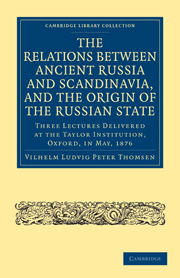 The Relations between Ancient Russia and Scandinavia, and the Origin of the Russian State
The Relations between Ancient Russia and Scandinavia, and the Origin of the Russian State Book contents
- Frontmatter
- PREFACE
- Contents
- LECTURE I ON THE INHABITANTS OF ANCIENT RUSSIA, AND THE FOUNDATION OF THE RUSSIAN STATE
- LECTURE II ON THE SCANDINAVIAN ORIGIN OF THE ANCIENT RUSS
- LECTURE III ON THE DENOMINATION AND HISTORY OF THE SCANDINAVIAN ELEMENT IN RUSSIA
- APPENDIX: OLD RUSSIAN PROPER NAMES
- ADDITIONS
- INDEX
LECTURE II - ON THE SCANDINAVIAN ORIGIN OF THE ANCIENT RUSS
Published online by Cambridge University Press: 29 August 2010
- Frontmatter
- PREFACE
- Contents
- LECTURE I ON THE INHABITANTS OF ANCIENT RUSSIA, AND THE FOUNDATION OF THE RUSSIAN STATE
- LECTURE II ON THE SCANDINAVIAN ORIGIN OF THE ANCIENT RUSS
- LECTURE III ON THE DENOMINATION AND HISTORY OF THE SCANDINAVIAN ELEMENT IN RUSSIA
- APPENDIX: OLD RUSSIAN PROPER NAMES
- ADDITIONS
- INDEX
Summary
In the preceding lecture I sought to take a survey of the ethnography of ancient Russia; I gave you Nestor's relation of the foundation of the Russian state, and I added a description of its founders, the Russ, derived from Greek and Oriental sources.
I am now going to lay before you evidence from other sources to corroborate Nestor's account of the Scandinavian origin of the Russ. I freely confess that most of this evidence is by no means new; but considering the opposition which has been raised against this view, it cannot be too often repeated, and I hope also to be able to present to you fresher and more correct views as to some of the details of the subject than have hitherto been entertained.
As I have mentioned before, the Greek form of the name Russ is Rhôs, 'Ρῶς (or Rusioi, Ρούσιοι), and from the close of the ninth century Byzantine literature abounds in references to the Rhos. There is no doubt that the Greeks were thoroughly acquainted with this people, and it is evident that they well knew how to distinguish them from other neighbouring nations and particularly from the Slavs. But if we ask for the real nationality of the people to whom the Greeks applied the name Rhôs, Byzantine literature itself gives us no direct and positive answer. A designation of them which sometimes occurs, is Scyths (∑κνθαί) or Tauroscyths (Τανροσκνθαί); but that is a learned name, not a popular one, referring only to their dwelling in the territory of the ancient Scyths, north of the Black Sea, without reference to their nationality.
- Type
- Chapter
- Information
- The Relations between Ancient Russia and Scandinavia, and the Origin of the Russian StateThree Lectures Delivered at the Taylor Institution. Oxford, in May, 1876, pp. 37 - 86Publisher: Cambridge University PressPrint publication year: 2010First published in: 1877
